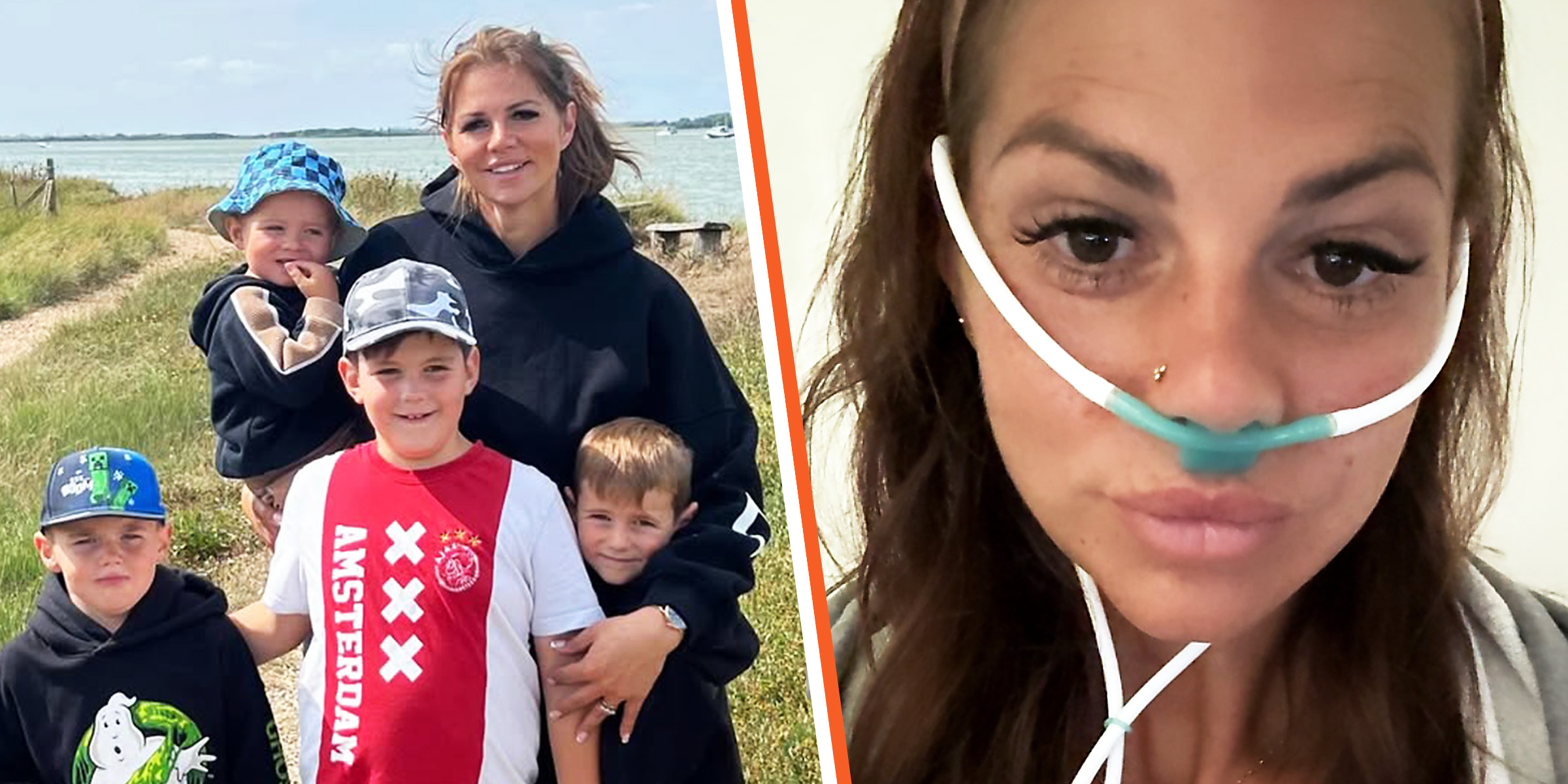
She Had Trouble Swallowing – Now This Mom of 4 Has Only Months to Live with an Incurable Disease
She first noticed it while adjusting to a new diet — just a small change that made meals a little harder to get through. It didn't seem like something serious. But months later, after a string of quiet warning signs, she's living a reality she never thought she'd face.
When she began having trouble swallowing, it didn't feel like the kind of thing worth worrying about. As a busy mother of four adjusting to a new diet, she chalked it up to a change in routine — nothing more.
But over the months that followed, that minor issue turned into something far more serious. By the time she returned to her doctor, the damage had already been done. What she first dismissed as diet-related discomfort was, in fact, the first sign of something incurable and rapidly advancing.
A Minor Eating Problem That Didn't Seem Urgent
In March 2024, Camilla Chapman noticed she was struggling to swallow solid food. At the time, she had recently switched her diet. Because of this, she didn't see the difficulty as a warning sign.
"A lot of the diet was liquid-based, but one of the solid foods you could make were pancakes, and quite often they would get stuck in my throat," Chapman explained. "I would need to drink water with them."
Chapman attributed the issue to her recent dietary changes, assuming it was nothing serious. She believed her body had grown accustomed to swallowing liquids and that she had become less mindful about chewing solid foods.
At that point, she didn't think it was necessary to seek medical advice. The symptom seemed too minor, too easy to rationalize, especially for someone managing young children and a growing business simultaneously.
A Lump, a Doctor's Visit, and a Missed Opportunity
By June 2024, three months after the swallowing issues began, Chapman noticed a small lump beneath her jaw. This time, she scheduled an appointment with her general practitioner. But during the visit, she did not mention her earlier trouble swallowing — only the lump.
Her doctor referred her for an ultrasound scan to evaluate the swelling. The results, Chapman said, appeared normal. She was informed that it was common for one gland to be slightly larger than the other and was reassured that there was nothing to worry about.
Relieved, she accepted the explanation and continued with daily life. The swallowing issue hadn't gone away, but it wasn't worsening rapidly either. In hindsight, this moment marked a critical turning point.
By the end of 2024, Chapman's swallowing difficulties had become more frequent and harder to dismiss. What began as an occasional inconvenience was now affecting her sleep, with the discomfort sometimes waking her at night. "I started to have a gut feeling that something wasn't quite right," she recalled.
This time, she acted on that instinct. In January 2025, nearly a year after the first signs appeared, Chapman returned to her doctor, now with a clearer picture of her symptoms. After months of uncertainty, Chapman was finally on the path to answers, and the news that followed was life-changing.
The Diagnosis: Late-Stage Disease with No Curative Options
In February 2025, Chapman underwent an endoscopy, a procedure that allows doctors to examine the inside of the digestive tract. As soon as she heard they were taking biopsies, she sensed what was coming.
A week later, a CT scan confirmed what doctors suspected: Chapman had an advanced, inoperable form of cancer that had spread to her lungs, liver, and lymph nodes. The diagnosis came nearly a year after she first noticed difficulty swallowing. By then, there was no longer a path to curative treatment.
Stomach cancer, also known as gastric cancer, occurs when abnormal cells begin growing uncontrollably in the stomach lining. In the United States, the disease most commonly develops at the point where the stomach meets the esophagus, known as the gastroesophageal junction.
In other parts of the world, it's more likely to form in the central portion of the stomach. Roughly 95 percent of stomach cancers begin in the stomach's inner lining and tend to progress slowly at first.
Left untreated, the disease can form tumors that grow deeper into the stomach wall and spread to nearby organs such as the liver or pancreas, exactly what had happened in Chapman's case.
The disease rarely causes symptoms in its early stages, which makes timely diagnosis difficult. Even the more common signs, such as unexplained weight loss or upper abdominal pain, often don't appear until the cancer is already advanced.
Symptoms may include:
- Difficulty swallowing
- Loss of appetite
- Stomach pain, especially above the belly button
- Feeling full after eating small amounts
- Fatigue or weakness
- Nausea or vomiting
- Heartburn or indigestion
- Black stool or vomiting blood
- Feeling bloated or gassy after meals
Because these symptoms overlap with many other, less serious conditions, stomach cancer can go undetected for months or even years. In Chapman's case, the absence of classic symptoms like acid reflux or persistent pain led her to dismiss the early warning sign entirely.
Refusing Chemotherapy to Preserve Quality of Life
After receiving her diagnosis in February 2025, Chapman was told there were no surgical options available and that her only medical path forward was palliative chemotherapy, treatment intended not to cure, but to slow the disease temporarily and manage symptoms.
She declined. "I don't want to take chemo," she said. "I have four young boys, and I want to still be able to go to the park with them. I don't want to live whatever time I have left in sickness." However, her decision was not made lightly.
Chapman had been given an estimated prognosis of one year to live. Undergoing chemotherapy would likely mean enduring fatigue, nausea, and other side effects that could make it difficult for her to remain active and present in her children's lives.
Instead of pursuing aggressive treatment, Chapman shifted her focus toward maintaining the quality of her remaining time. With limited options available through the NHS, she began exploring alternative therapies, lifestyle support, and ways to step back from work to be more present with her family.
Turning to the Community for Support
Shortly after her diagnosis, Chapman took to social media to share the news with followers of her family's garden business, Hope Plants. In an emotional Instagram post dated February 13, 2025, she opened up about her condition and the limited treatment options available.
"It's with a very heavy, broken heart I write this post," she began. "I have just been diagnosed with stomach cancer, which has unfortunately spread to my liver, lungs, and lymph nodes. We were told by the doctor that there is nothing they can do for me other than chemo to try and extend my life."
Although she had declined chemotherapy, Chapman made it clear she hadn't given up hope. "I am refusing to believe that this is it, and I will do anything to support my body and family through this," she wrote. "My boys are only 8, 6, 5, and 3, and I can't even imagine not being here to see them grow up… It's just not an option."
She launched a JustGiving campaign to help raise money for alternative treatments and to allow her to step away from the demands of work. The business she had built with her partner, Matt, had been running since 2020, and now, she was leaning on the same community that had helped them grow it from the ground up.
"Our business is called HOPE for a reason, and now we need all the HOPE in the world," she added. "Please share my story and support where you can. I believe that with the right attitude, anything is possible."
A Call to Others: Don't Overlook Small Changes
As her story gained attention, Chapman began using her experience to encourage others to take even minor symptoms seriously. "It is easy to dismiss. It can be just a small change, maybe how you swallow or sound, but I would tell anyone who had the same symptoms as me to just go and get it checked out," she cautioned.
Her message is direct: don't wait. Chapman had no pain, no weight loss, and no digestive distress in the early stages. She had a single, subtle symptom, and for nearly a year, that symptom went unexplored. For Chapman, sharing this message has become as important as any treatment plan.
She knows she can't rewrite her own story, but she hopes she might help someone else rewrite theirs. Chapman continues to navigate each day with a focus on presence and purpose. She remains committed to exploring every possible option to support her health and extend her time with her family.
As she wrote in her February post, quoting Audrey Hepburn, "To plant a garden is to believe in tomorrow." For Chapman, that belief remains at the heart of everything she's fighting for — her family, her business, and the hope that her story might inspire someone else to act before it's too late.
Another mother facing a devastating diagnosis chose to speak openly about the emotional toll it was taking on her children. Misty De La Cruz, a mother of eight, was already enduring intensive treatment for an aggressive illness when she received a heartbreaking call from her son's school.
The information in this article is not intended or implied to be a substitute for professional medical advice, diagnosis or treatment. All content, including text, and images contained on news.AmoMama.com, or available through news.AmoMama.com is for general information purposes only. news.AmoMama.com does not take responsibility for any action taken as a result of reading this article. Before undertaking any course of treatment please consult with your healthcare provider.
